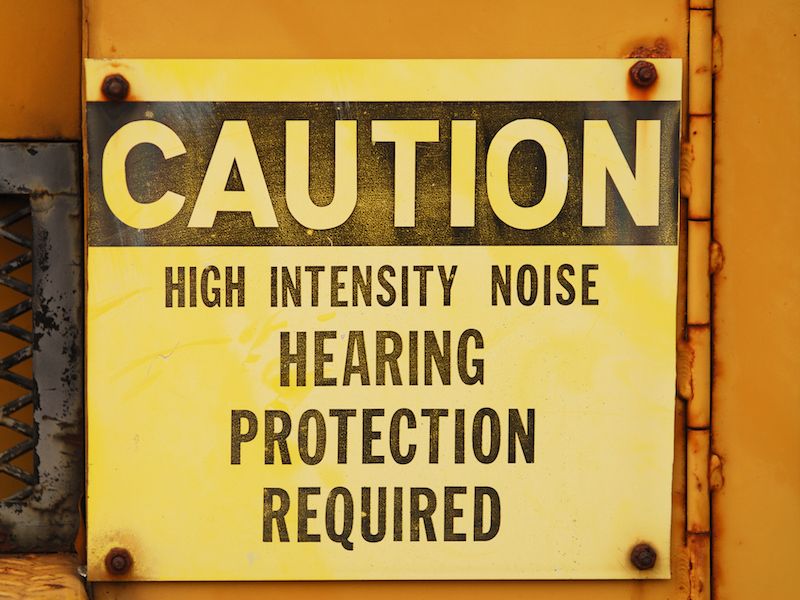
Realizing you should protect your ears is one thing. Knowing when to protect your ears is another matter. It’s not as simple as, for example, determining when to use sunscreen. (Are you going to go outside? Is there sunlight? You should be wearing sunscreen.) Even knowing when you need eye protection is simpler (Working with dangerous chemicals? Doing some building? You need eye protection).
It can feel as though there’s a large grey area when addressing when to use hearing protection, and that can be risky. Often, we’ll defer to our normal tendency to avoid hearing protection unless we’re given information that a particular place or activity is dangerous.
Risk Evaluations
In general, we’re not very good at assessing risk, especially when it comes to something as intangible as long term hearing damage or loss of hearing. Here are some examples to demonstrate the situation:
- Person A attends a very loud rock concert. 3 hours is around the length of the concert.
- Person B owns a landscaping company. She spends a considerable amount of time mowing lawns, then she goes home to a quiet house and reads a book.
- Person C works in an office.
You may think that person A (let’s call her Ann, to be a little less formal) may be in more hearing danger. For most of the next day, her ears will still be ringing from the loud performance. Assuming Ann’s activity was risky to her ears would be sensible.
The noise that person B (let’s just call her Betty), is exposed to is not as loud. There’s no ringing in her ears. So it has to be safer for her hearing, right? Not necessarily. Because Betty is pushing that mower every day. So even though her ears never ring out with pain, the injury accrues slowly. Even moderate sounds, if experienced with enough frequency, can injury your ears.
What’s occurring with person C (let’s call her Chris) is even more difficult to sort out. Most people realize that you should protect your hearing while running machines such as a lawnmower. But even though Chris works in a quiet office, she has a really noisy, hour-long commute every day through the city. Additionally, while she works at her desk all day, she listens to her music through earbuds. Does she need to consider protection?
When You Should be Concerned About Protecting Your Ears
The standard rule of thumb is that if you need to raise your voice in order to be heard, your environment is noisy enough to do damage to your ears. And you should consider using earplugs or earmuffs if your surroundings are that noisy.
The cutoff needs to be 85dB if you want to be scientific. Sounds above 85dB have the ability, over time, to result in damage, so in those circumstances, you need to consider wearing hearing protection.
Most hearing specialists recommend making use of a specialized app to keep track of noise levels so you will be aware when the 85dB has been reached. These apps can let you know when the ambient noise is nearing a harmful level, and you can take suitable steps.
A Few Examples
Even if you do get that app and bring it with you, your phone may not be with you everywhere you go. So we might develop a good standard with a couple of examples of when to protect our hearing. Here we go:
- Working With Power Tools: You know that working every day at your factory job will call for hearing protection. But what if you’re just working in your garage all day? Most hearing professionals will suggest you wear hearing protection when using power tools, even if it’s only on a hobbyist basis.
- Every day Chores: Even mowing a lawn, as previously stated, necessitates hearing protection. Chores, such as mowing, are most likely something you don’t even think about, but they can lead to hearing impairment.
- Commuting and Driving: Driving all day as an Uber or Lyft driver? Or perhaps you’re just hanging out downtown for work or boarding the train. The constant noise of city living, when experienced for 6-8 hours every day, can cause damage to your ears over the long haul, especially if you’re cranking up your music to hear it over the din.
- Listening to music with earbuds. This one requires caution, more than protection. Whether your music is playing directly into your ears, how loud it’s playing, and how long you’re listening to it are all things you should pay attention to. Consider using headphones that cancel out outside sound so you don’t have to turn up the volume to damaging levels.
- Exercise: You know your morning spin class? Or maybe your nighttime yoga session? You might think about wearing hearing protection to each. Those instructors who make use of sound systems and microphones (and loud music) to motivate you might be good for your heart rate, but all that volume is bad for your ears.
These examples might give you a good baseline. If there is any doubt, though, use protection. In the majority of cases, it’s better to over-protect your hearing than to leave them subject to possible harm down the road. Protect today, hear tomorrow.